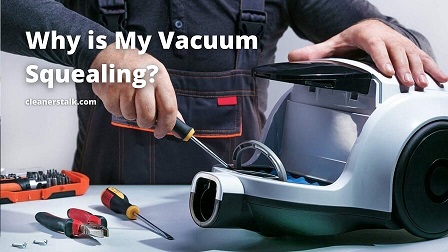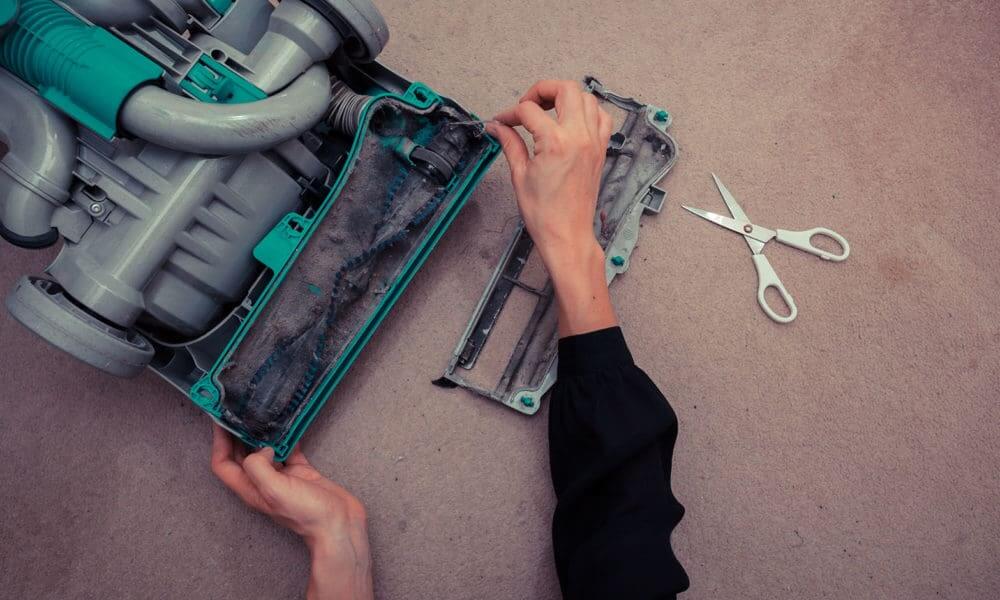
Why is My Vacuum Squealing (High-Pitched Noise)?
Cleaners Talk is reader-supported. This post contains affiliate links, we may earn a commission at no additional costs to you. As an Amazon Associate we earn from qualifying purchases.
Are you wondering: why is my vacuum cleaner squealing and making a high-pitched noise? Relax, you are not alone. Many vacuum cleaner owners wonder about the same thing. When your vacuum cleaner is making high-pitched noises, it is clearly sending you a signal that it is in desperate need for your attention.
Why does my vacuum make a high-pitched noise? A high-pitched noise made by a vacuum cleaner is often caused by an airflow blockage. While a vacuum cleaner makes a steady, low-pitched noise, it may change into a high-pitched noise when there is airflow obstruction or it is not set to the right height adjustment.
With that said, fixing the squealing problem should be very easy to do. All it takes is a simple assessment paired with the right know-how. In this post, we will answer the question: why does my vacuum make a high-pitched noise? By the end of this post, your vacuum should be squealing no longer.
Why Does My Vacuum Make a High-Pitched Noise?
It is very normal for vacuum cleaners to emit sound. In fact, most vacuum cleaners produce a steady, low-pitched noise when they are in operation. This noise, however, may fluctuate in volume as different sizes of dirt and debris go through the vacuum cleaner. This indicates that there is proper airflow.
Only when the airflow is disturbed, will a vacuum cleaner produce an odd, high-pitched noise. So, before you throw your vacuum cleaner away and buy a new one, it is best to do a simple assessment. A vacuum cleaner may produce a high-pitched noise or squealing sound because of two things:
1. Airflow Obstruction
A vacuum cleaner may make a high-pitched noise if there is an airflow blockage or obstruction. The places most likely to make the whistling sound are the hose and canister. Because vacuum cleaners rely on airflow to suck dirt, any blockages will reduce suction power, thus creating a squealing noise.
2. Incorrect Height Adjustment
Alternatively, the high-pitched noise may be caused by an incorrect height setting. A vacuum cleaner may require more effort when cleaning carpets, as opposed to flat surfaces. Because of this, it may produce a squealing sound. See if it is the normal range by moving the vacuum cleaner to a different type of flooring.
How to Fix a Squealing Vacuum Cleaner

Now that you know why your vacuum is squealing, it is time to address the problem. Fortunately, solving the issue is as simple as it can be. Here is how to fix the high-pitched noise made by a vacuum cleaner. Start by turning off and unplugging your vacuum cleaner, and let’s get started.
1. Clean the Brush Roller and Nozzle
Once you have unplugged the vacuum cleaner, the first thing you should do is to inspect the brush roller and nozzle. Often, long strings of hair and piles of dust are caught in the brush. Simply remove them by using a pair of scissors. Look for any obstructions in the nozzle and remove them as well.
2. Remove and Clean the Hose
Once the brush roller and nozzle is clean, disconnect the hose from the base of the unit and check for any possible blockages, and clean them thoroughly. Both the diverter and the foot hose are other hose connection points you need to check. Straighten the hose to look for and remove any blockages.
3. Check the Vacuum Bag
It is important to check the vacuum bag too. Look at the dust bag for items that may be blocking the airflow. If there is a big dust bunny inside blocking the airflow, you will hear the vacuum cleaner whine, begging you to either empty or replace the vacuum bag. Inspect the nozzle connection point and clean it as well.
PRO TIP: While most vacuum cleaner bags are excellent in blocking harmful particles, it is always a good idea to replace them regularly. Not only does it promote better airflow for the vacuum cleaner, but it prevents the contaminants from escaping back into the environment, or worse yet, your house.
4. Clean the Filters
The filters are one of the most neglected areas of a vacuum cleaner. Clean the vacuum filter by gently tapping it over a trash can. If the filters are washable, rinse and air-dry it completely before reinstalling it into the vacuum cleaner. A wet or damp filter may cause mold and mildew to form inside the vacuum cleaner.
5. Set the Right Height Adjustment
Last but not least, be sure to set your vacuum cleaner to the correct height adjustment. It is important to look at the height adjustment knob and adjust it to the right setting for the surface being cleaned. Cleaning hardwood floors will require a different setting compared to cleaning high-pile carpets.
Often, the high-pitched or squealing noise might just be the sound generated as the vacuum cleaner works on carpet. Your vacuum cleaner may be so high above the carpet fibers that you do not get a good clean. Instead, you get a high-pitched noise. Changing the brush level or head setting should do the trick.
Remember, low settings are best for bare floors or delicate carpets, medium settings are best for most carpet surfaces, and high settings are appropriate for plush or high-pile carpet surfaces. By making sure your vacuum cleaner is set appropriately, you should have it running smoothly and pleasantly.
PRO TIP: If your vacuum cleaner is still making odd noises after you have assessed and done the above tips, it may be time to replace your vacuum cleaner. It is not good practice to employ an old vacuum cleaner. Instead, you can save time and energy by investing in the best upright vacuum cleaner. Be sure to choose the right one!
Final Words
And there you go, a simple post to answer the question: why is my vacuum squealing and making a high-pitched noise? Remember, it is very normal for vacuums to produce sound. By making sure there are no airflow blockages, you should have your vacuum cleaner operating and sounding the way it is supposed to be.
